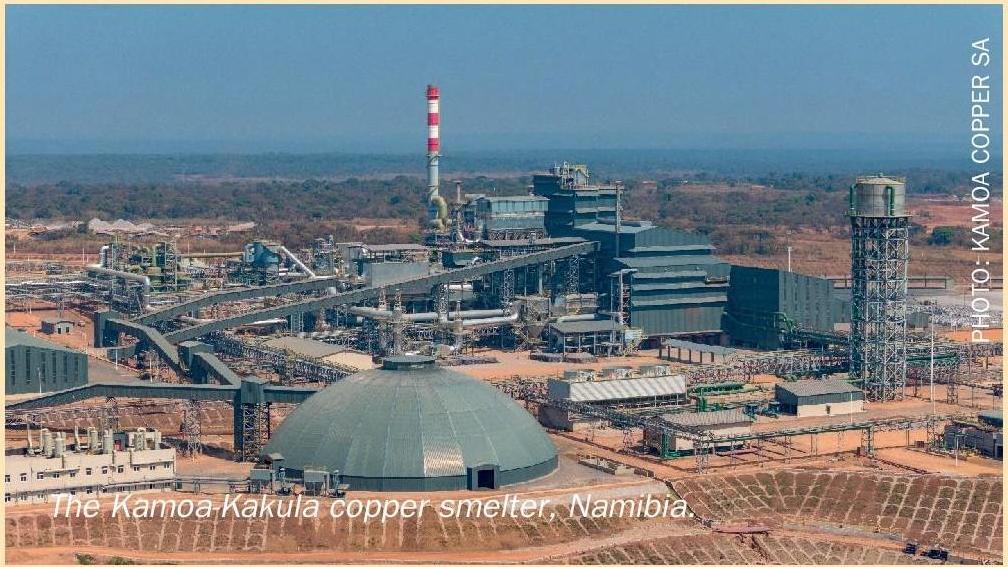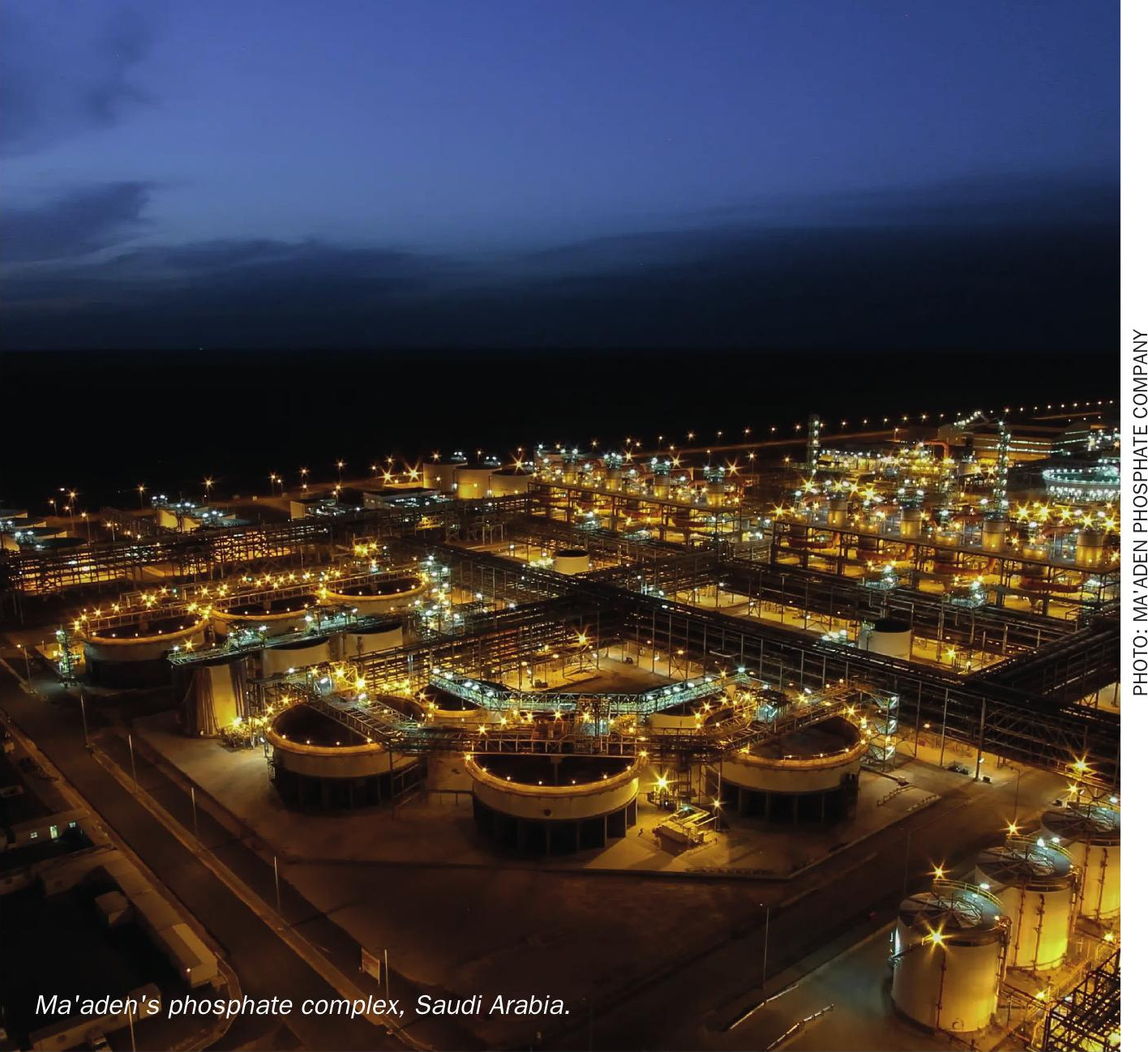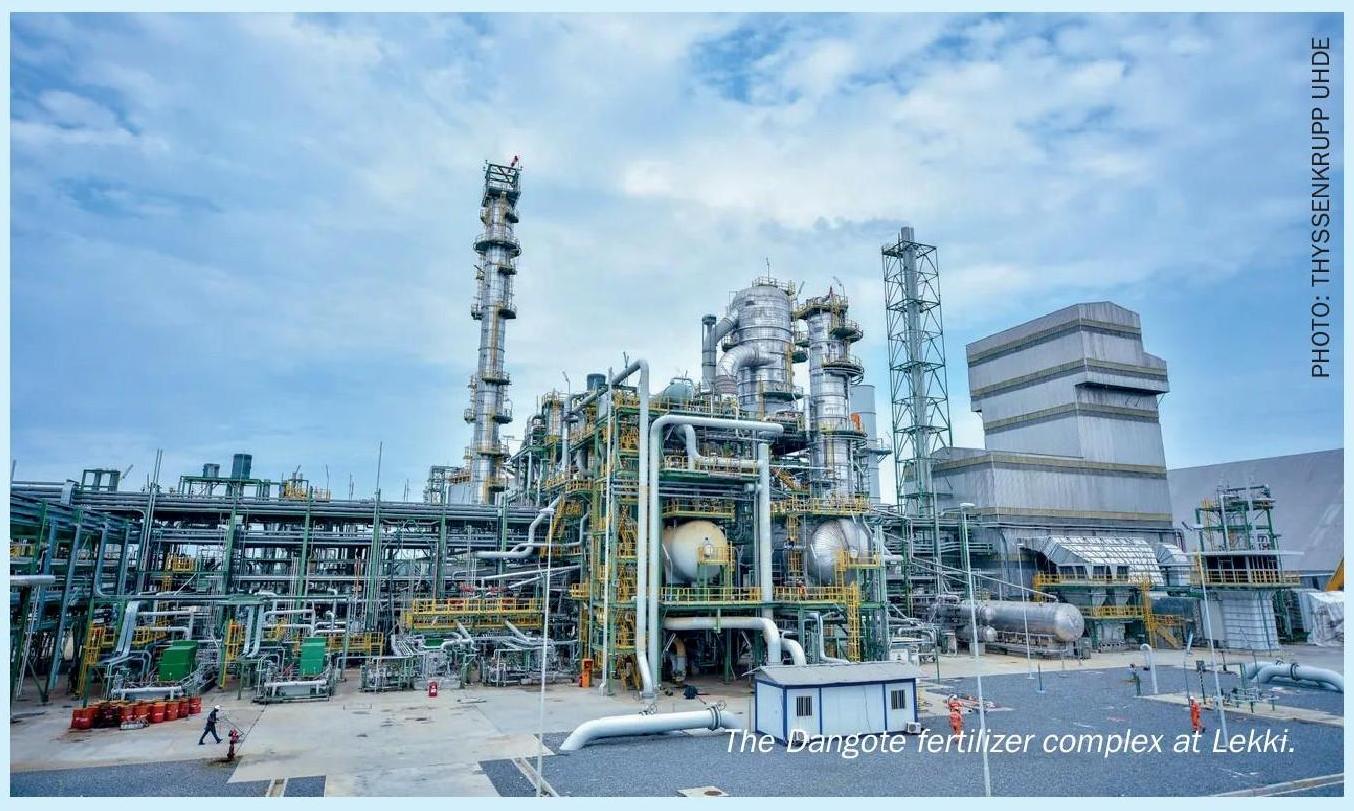Nitrogen+Syngas 366 Jul-Aug 2020
31 July 2020
Nitrogen Industry News Roundup
Nitrogen Industry News
EGYPT
Ammonia contract finalised
Maire Tecnimont subsidiary Tecnimont SpA has finalised its $350 million EPC contract with Egypt Hydrocarbon Corp. (EHC) for the construction of a new ammonia plant at Ain Sokhna. The preliminary contract was announced in September last year. The contract for the plant, which will produce 1,320 t/d of ammonia, also includes extensive utilities and offsite facilities. Project completion is scheduled for 36 months from the effective contract date, which will be triggered by financial closure of the project. Project finance is being arranged by the Italian export credit agency SACE and the US EXIM Bank. The ammonia will be used to feed an ammonium nitrate plant, already existing and in operation in the same industrial facility, also owned by EHC.
Basil El-Baz, EHC chairman, said: “This contract is another outstanding opportunity to work with Maire Tecnimont, a company we trust with best in class expertise and experience. The EHC expansion project is a vote of confidence in the Egyptian economy and the reforms that have been undertaken to date. The project will serve as a catalyst for the mining sector, attracting foreign investment and increasing employment opportunities and providing the raw materials needed for the sectors activities.”
Pierroberto Folgiero, Maire Tecnimont Group CEO, added: “With this achievement we are proving once again the great resilience of our core business in a particularly challenging period for the whole market. We are also really proud to play a strategic role in the development of the fertilizer industry in Egypt with an entrepreneurial client such as EHC.”
Stamicarbon completes stripper for urea melt plant
Stamicarbon says that the first piece of high pressure equipment for NCIC’s new urea melt plant in Egypt has been completed on time. The stripper was fabricated at Schoeller-Bleckmann Nitec GmbH (SBN) in Austria, and is now awaiting shipment. The new urea melt plant is being built at Ain Sukhna by thyssenkrupp Industrial Solutions (tkIS) as part of a consortium with Egyptian company Petrojet, for Egyptian chemical and fertilizer manufacturer El Nasr Company for Intermediate Chemicals (NCIC). The plant will have a capacity of 1,050 t/d and forms part of a new fertilizer complex which will include 440,000 t/a of ammonia, 380,000 t/a of urea and 300,000 t/a of calcium ammonium nitrate (CAN) every year. Completion is set for 2022.
Stamicarbon’s Erfan Afrasiabi highlighted the “teamwork and determination” to deliver on the client’s expectations. “I’m really happy because we can now literally touch the results and all the effort put in by the team,” he said, referring to the completed stripper. “We did a lot of expediting to be sure that all materials would be delivered right on time. Even with high shop load and the impact of Covid-19, and remote expediting and inspections, the stripper was ready exactly on time.”
AFRICA
LNG projects likely to be deferred
Sub-Saharan Africa is likely to see a slowdown in upstream activity for ongoing projects and final investment decisions (FIDs) in 2020, according to data and analytics company GlobalData. Conor Ward, Oil & Gas analyst at GlobalData commented: “With global crude oil prices currently hovering around the $30/bbl mark and cases of Covid-19 on the rise daily, companies have been forced to rethink project timelines for 2020 and operators are beginning to scale back spending in the short-term as they struggle to source adequate capital.”
Major capital intensive projects in the region such as the liquefied natural gas (LNG) mega projects in Mozambique, as well as the projects in Uganda and Kenya look likely to continue to face further delays considering the current economic climate. The most capital-intensive project in the region is the Mamba complex in Mozambique, and with ExxonMobil expected to reduce capex by approximately 20% it is likely that this project will be unable to secure an FID in 2020, according to Ward. Only efficient and robust projects that can survive in a low-oil-price environment, or can be sheltered from external market factors, are likely to go ahead this year.
Ward continued: “Projects that are already under construction with investment finalised will contractually have to go ahead, but will likely face disruption to their timescales. This will be particularly pertinent for landlocked countries that require external supply chains often deriving from shipyards or supply bases in China or Asia-Pacific where the outbreak of Covid-19 began.”
CROATIA
Petrokemija resumes ammonia production
On May 14th Croatian fertilizer producer Petrokemija said that it had resumed operations at its 450,000 t/a Kutina ammonia plant following a week-long shutdown due to a technical failure. The ammonia plant halted operations on the evening of May 7th, but Petrokemija said that its downstream fertilizer plants continued to operate as planned.
NIGERIA
Commissioning ongoing at Dangote
Dangote Industries says that it has achieved mechanical completion at its new fertilizer complex at Lekki near Lagos in Nigeria. In a statement to the Nigerian Investment Promotion Commission, Dangote Group Executive Director for Strategy, Portfolio Development and Capital Projects Devakumar Edwin, said that all sections were completed and were in pre-testing. He also said that the plant started receiving gas from the Nigerian Gas Company and Chevron Nigeria Ltd in February, and was expecting turbine start-up in late June and the beginning of commissioning. He said the Covid-19 pandemic and some technical challenges delayed the inauguration of the plant, which was initially scheduled to take place in May.
The facility consists of two 1.3 million t/a ammonia-urea trains, the first of which is now beginning trial operations, and which is likely to begin producing stable product by September this year. Exports are expected to begin in the first half of 2021. Edwin noted that 25% of production will be reserved for domestic production and the remainder exported.
INDIA
RFCL to begin production in late June
Ramagundam Fertilizers and Chemicals Ltd (RFCL) says that, following the completion of pre-commissioning works and a trial run of the company’s newly completed plant at Ramagundam, it expects to begin commercial production in late June. Production had been planned to start at the end of Marsh, but was delayed by India’s Covid-19 lockdown. However, the government exempted the company from the lockdown from April because of the importance of fertilizers for India’s agricultural industry. The new plant will produce 1.27 million t/a of urea. RFCL is a joint venture between National Fertilizers Ltd (NFL), Engineers India Ltd (EIL), both with a 26% stake, the Fertilizer Corporation of India (FCI) and the Telangana government (11% each), the Gas Authority of India limited (14.3%) and the HTAS consortium (11.7%).
Fertilizer re-starts boost gas demand
India’s gas demand rose by around 50% during April as the government eased restrictions on businesses following a two month lockdown due to the Covid-19 pandemic. Although the lockdown officially ended on May 31st, as noted above the government allowed chemical plants, factories and downstream industries to restart ahead of this. State-run distributor GAIL said that sales of gas had increased from 50 million m3 /d at the start of April to around 75 million m3 /d by the end of the month, with fertilizer companies among the biggest buyers, as the onset of harvesting spurred demand for urea. Total Indian gas consumption in March was 139 million m3 /d according to GAIL, with fertilizer plants accounting for 30% of this.
RUSSIA
Casale says that Metafrax AUM project continues to make progress
In a recent public statement, Casale said that, despite the serious hurdles caused by the Covid-19 pandemic and the necessity to insure and preserve the health and safety of all parties involved in the project, particularly the company’s own site team, construction of the large ammonia-ureamelamine (AUM) complex at Metafrax is making steady progress.
Casale said: “At the onset of the pandemic, appropriate measures and strategies were quickly put in place in view of soften, to the maximum extent possible, the negative impact due to the situation, especially as far as the schedule is concerned. First and foremost, all our site team members have been tested for the virus. We are happy to say that none has resulted positive. We have strictly complied with all norms and procedures enacted by Russian authorities with the purpose to thwart the pandemic. All this has given us the confidence not only to go ahead but to actually increase the strength of our site team, with more people being deputed there. Meanwhile, for all vendors, specific procedures have been arranged enabling to work remotely, with minimal disruption of the workflow and hence reduced impact on schedule.
“All equipment of all units was already delivered to site before the pandemic struck, while it has been possible to anticipate the critical activity of testing and qualifying the welders since all relevant materials and procedure were made available well in advance than scheduled. Owing to this, the piping prefabrication and installation could be started and it is underway. All the above strengthen our confidence that the ammonia unit will be put on stream within the end of this year.”
In a separate statement, the company has also said that a surge test of the turbo-set of the 1,500 t/d nitric acid plant at Navoyazot in Uzbekistan has also been successfully completed, and the acid plant was expected to start up as scheduled at the end of May.
DENMARK
Haldor Topsoe joins UN Global Compact
Haldor Topsoe has joined the United Nations Global Compact, the world’s largest sustainability initiative. Joining the compact commits members to aligning policies and action with the UN Global Compact’s Ten Principles. These are aimed to provide companies with clear guidelines on responsible business practices within areas such as human rights, labour, the environment, and anti-corruption.
“We are pleased to be a part of this global initiative. Joining the UN Global Compact reaffirms our existing commitment to building our business around responsible and transparent practices. It aligns well with our continuous strive to create sustainable solutions that make a difference in the world of today – and tomorrow. We look forward to engaging with peers to collaboratively learn and promote sustainable development globally,” says Christian Stender, Compliance & Sustainability Director.
Topsoe says that it is currently making an assessment of how the company’s product offerings impact the world’s global challenges according to the UN Sustainable Development Goals (SDGs) framework. The assessment is expected to be finalised later this year.
UNITED STATES
Koch launches digital solutions business
Koch Engineered Solutions, a division of Koch Industries, Inc., has launched OnPoint, a digital solutions business which aims to leverage the company’s engineering capabilities and expertise in combination with digital technology to deliver greater value for customers. The platform seeks to deliver real-time insights and enhanced system performance across a variety of industrial processes, harnessing knowledge and experience from Koch’s equipment businesses to provide actionable insights that help operators identify root causes, analyse performance, and optimise equipment and operations. It is based around John Zink Hamworthy Combustion’s Smart Combustion™ , with the addition of virtual combustion assistant EMBER™ as well as ZoloSCAN. Koch-Glitsch’s TowerView solution applies expertise in mass transfer and is another emerging solution in the OnPoint portfolio, along with established analytics platform CORTEX™ and business intelligence solution Energy Manager.
“Historically, industrial operations have not taken full advantage of the data they routinely capture, the knowledge of equipment designers, or advanced data analytics to enable actionable insights,” said Chip Hilarides, president of OnPoint. “OnPoint was created to bring the deep expertise of John Zink, Koch-Glitsch, and other Koch businesses to industrial operations and usher in the next generation of efficient, profitable operations. The OnPoint team works directly with customers to deliver solutions that help them operate safer, cleaner, more efficiently, and with higher throughput.”





